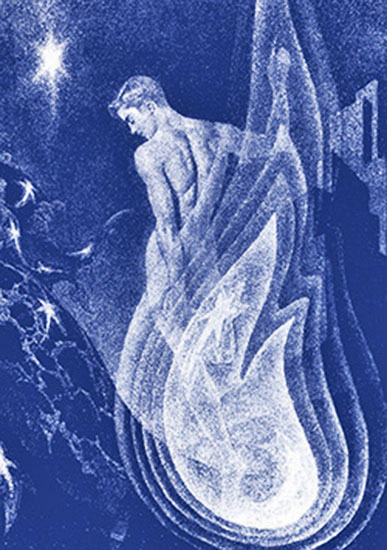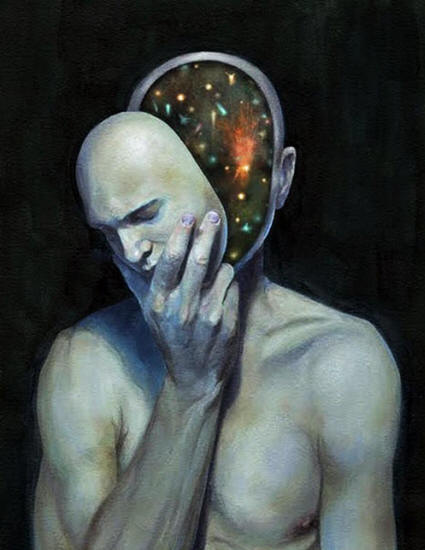|
September 20, 2015 New Dawn No. 100 - Jan-Feb 2007 from NewDawnMagazine Website
blessed is he who has none, but woe and grief to him
who has it in embryo. 1
What happens after that, though, is anybody's guess.
Once we've been created equally,
These questions have excited the myth-making faculties of humankind from antiquity down through to the present day.
Whereas it is accepted as a given within Judeo-Christian tradition that each human is born with a soul, Gurdjieff does not let us off so easy. Active in the early part of the 20th century, this Greek-Armenian mystic travelled the world, synthesizing spiritual disciplines into a unique path called The Fourth Way.
He taught that human existence is a kind of waking sleep, in which we live more or less automatically, unconscious and unaware of ourselves.
He even went to the extreme of suggesting that humans are not born with souls at all, and that we can only create one while alive through intense personal suffering and what he called "work."
If we are not successful
in this venture, he taught that our identities would not survive the
shock of death, that we would "die like dogs" and that the
ever-hungry Moon would gobble up
our energy as part of its own evolution of consciousness.
Consider the words of the Gospel of Philip, an ancient Gnostic codex recovered at Nag Hammadi in 1945:
Like the other Gnostic texts recovered at Nag Hammadi, this type of information was declared heretical, banned and except for in a few lucky cases, completely destroyed by the early Catholic Church in an effort to consolidate both its teachings and its power structure.
The Catholic story-system pivots around the idea that we will be resurrected at the end of time, not transmuted to higher levels of understanding and awareness here in our lifetimes.
The Gnostic texts, on the
other hand, seem to teach that humans are born with a spark of
divinity which can either be left undeveloped or guarded and fanned
into a full-on blaze.
Who benefits by
suppressing this ancient gnosis, and what happens to those of us
left in the dark as a result?
Through the lens of trashy sci-fi novels, he explored questions of what is ultimately real, and what constitutes the authentic human. He used outlandish and bizarre plot devices to fling his characters through inverted realities and distorted mindscapes.
And from his explorations, he came to believe that:
Similar themes appear in popular and fringe culture.
In the movie The Matrix, we see a false reality maintained by mysterious agents who can slip in and out of the bodies of ordinary people as though they were clothing.
The paranormal investigations of people like John Keel, Jacques Vallee and others also posit the existence of ultraterrestrials, a race of entities who evolved right alongside us on the planet Earth.
They are thought to camouflage themselves, adapting imagery pulled from the human minds and cultures they interact with.
In other words, they
appeared to the ancients as angels and demons, to
medieval people as fairies and goblins, and to us
today as alien visitors.
Carlos Castaneda's Don Juan echoes this sentiment in The Active Side of Infinity, suggesting that malicious beings or "predators" seek to control us by,
Unfortunately for us though, it is not just science fiction authors and occultists who have explored ideas like this.
In "real life," similar notions of humans as fundamentally without soul took root among psychologists who espoused the philosophies of Behaviourism and Eliminative Materialism in the middle part of the 20th century.
In short, these thinkers (perhaps paradoxically) believed that internal human states were nothing but a fiction, a primitive "folk psychology," and that only externally observable behavior had any real significance.
They saw concepts such as belief, desire, fear, love - even the mind and soul - as untenable, unscientific and therefore ultimately unreal and useless.
Noted Behaviourist B.F. Skinner encapsulated the quest to abolish "inner man" in his book Beyond Freedom and Dignity, with this chilling passage:
At first glance, strong thematic similarities tie together the cores of Skinner's and esoteric philosophies such as that of Gurdjieff.
Both strip humans of any kind of inherent soul.
Skinner, however, seems to revel in the thought, because it means that human behavior may be controlled by those with the power and drive to do so. It is, in essence, the Holy Grail of scientifically-driven totalitarian systems of governance.
Applied to world events, it may help explain the inhuman atrocities we see played out on the global scale every day.
On the other hand though, we have folks like Gurdjieff who follow in the footsteps of the ancient Gnostics, and after introducing us to our fundamental dilemma rather than celebrating it, chart for us a way out of the shackles of an empty, automatic and manipulable existence.
Instead, it is (or can
be) a healing process whereby an individual overcomes the
impossibility of their own situation, and the insanity of the
culture at large. In his vision, it was not individual humans who
were fundamentally disturbed, but the culture which was dangerous
and insane, warping and distorting the natural human into the
artificial confines of local cultural existence.
Certain sects taught that this material world was created by the Demiurge, an insane creator god who was conceived in error, and who egotistically took himself to be the only true god.
Tradition identifies him either as the angry Yahweh of the Old Testament ("Thou shalt have no other gods before me"), as Satan in his role as Prince of this world, or with more overtly Gnostic variants such as,
Philip K. Dick mythologized this hierarchy of institutional insanity into what he called the Black Iron Prison, which is ruled over by a never-ending, infinitely destructive Empire.
In his Tractates Cryptica Scriptura, 7 an esoteric addendum to his novel VALIS, he wrote,
Thus it would seem that the only rational course for an individual to become and stay sane is to overcome his culture, his society, and maybe even God himself (or at least the deranged being which the Gnostics believed masquerades as God).
Dick identified this cosmic force with the Holy Spirit, the Christian concept of the Logos, or the divine Word (hence, living information) which was made flesh in the person of Jesus Christ.
Like the ancient Gnostics, Dick believed that this divine entity - the plasmate - could fuse with, not just Jesus, but with potentially anyone who was worthy.
There is no indication that Dick believed humans fundamentally lacked souls, but he seems to have believed that the plasmate healed and restored people to sanity, and to their natural whole state.
In his novels VALIS and Radio Free Albemuth, he fictionalized these experiences, describing numerous encounters in dreams, hallucinations and waking life with a benevolent higher order entity which he variously described as a cosmic artificial intelligence, ancient alien beings, the living information of the plasmate, and of divinity itself.
Both his fictional
characters and he himself underwent extreme pain, personal turmoil
and intense soul-searching, which perhaps could be correlated to
what Gurdjieff meant as the "work" required to fashion oneself a
soul or subtle body with which to escape the obliteration of death.
Here we may once again turn to the ancient Gnostics for inspiration and amplification.
From The Apocryphon of John, another text recovered at Nag Hammadi, we find:
In Dick's worlds, once you have crossed that threshold and reconnected to the universal soul (or created a soul, as Gurdjieff's teachings might indicate), others who have done the same will be revealed to you, so that you may strengthen one another and work toward a common goal.
In VALIS, Dick referred to these kindred spirits as Secret Gray Robed Christians (or homoplasmates - those who had "cross-bonded" with the living information of Christ or the Holy Spirit, thereby attaining eternal life).
Upon their shoulders lay the immense task of nothing less than the overthrow of the Black Iron Prison itself:
The idea that not all humans have souls is a fascinating line of thought which invariably leads to dangerous and even violent territory when employed by the agents of Empire.
One need look no further than Nazi Germany's wholesale execution of what they claimed were the "sub-human" Jews as vivid examples of the extravagant danger of these ideas.
It is one thing to
explore mystical truth for the purposes of personal development; it
is quite another altogether to use it as an excuse and explanation
for violent, thoughtless, and inhuman action.
We may all be created equal, but what do we do after that?
The 12th century Sufi, Farid ud-Din Attar, in his "Conference of the Birds," offered the following:
|



